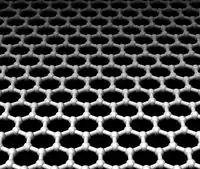graphene
See also: graphène
English

A model of graphene's chemical structure.
Etymology
From graph(ite) + -ene.
Pronunciation
- IPA(key): /ˈɡɹæf.iːn/
Noun
graphene (plural graphenes)
- (organic chemistry) Any polycyclic aromatic hydrocarbon having the structure of part of a layer of graphite.
- (inorganic chemistry) An arbitrarily large-scale, one-atom-thick layer of graphite, an allotrope of carbon, that has remarkable electric characteristics.
- 2014 April 13, Nick Bilton, “Bend it, charge it, dunk it: Graphene, the material of tomorrow”, in The New York Times:
- Graphene is the strongest, thinnest material known to exist. A form of carbon, it can conduct electricity and heat better than anything else. And get ready for this: It is not only the hardest material in the world but also one of the most pliable. Only a single atom thick, it has been called the wonder material. Graphene could change the electronics industry, ushering in flexible devices, supercharged quantum computers, electronic clothing and computers that can interface with the cells in your body.
-
Derived terms
- -ene (monolayer materials similar to graphene)
- graphane
- penta-graphene
Related terms
Translations
large-scale, one-atom thick layer of graphite
|
|
See also
This article is issued from Wiktionary. The text is licensed under Creative Commons - Attribution - Sharealike. Additional terms may apply for the media files.